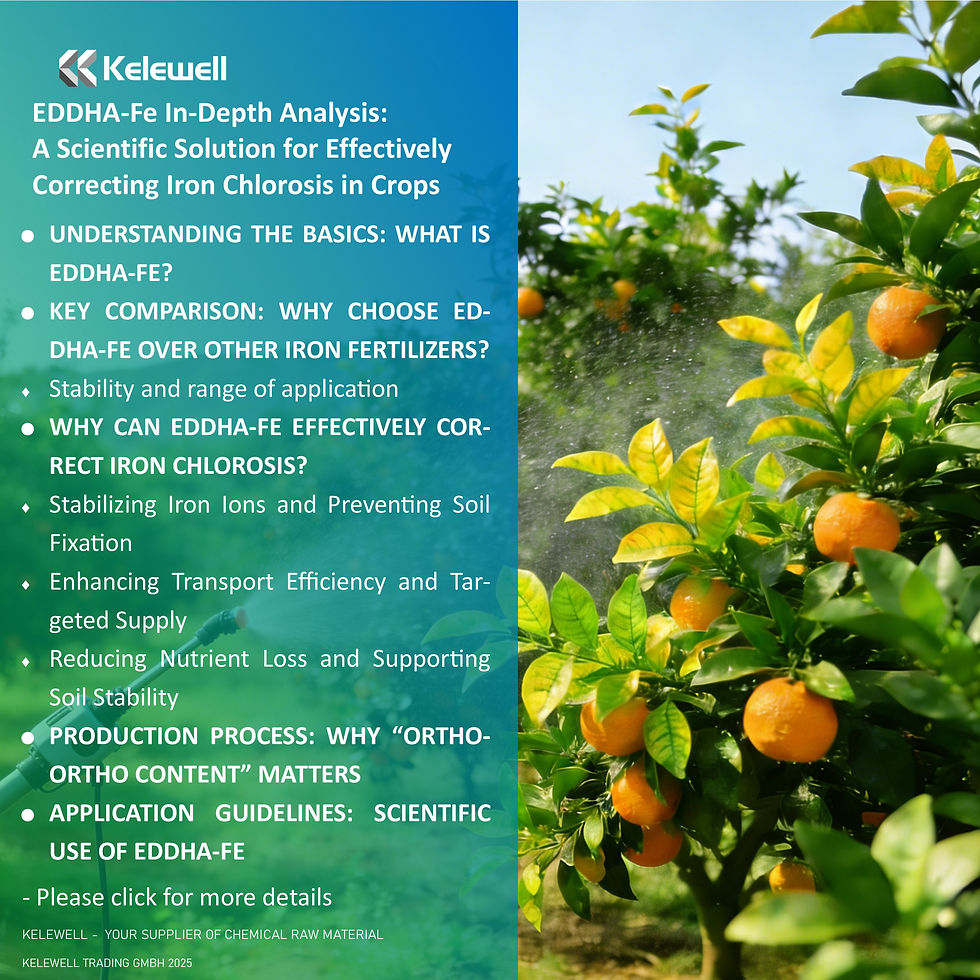They are all plant growth promoters - so what makes triacontanol different?
- Camille W.

- Nov 19, 2025
- 3 min read
Last week, we introduced many application scenarios of triacontanol as a plant growth promoter. You can review it here:https://www.kelewell.de/en/post/triacontanol-from-beeswax-to-biotechnology-the-science-of-natural-growth-stimulation
Today, several plant growth promoters are commonly used on the market, such as triacontanol, brassinolide, sodium nitrophenolate, and DA-6 (diethyl aminoethyl hexanoate). All of them help promote plant growth — but how exactly do they differ?
1. Mechanisms
(1) Triacontanol
Triacontanol mainly enhances the activity of various enzymes such as polyphenol oxidase, improves cell membrane permeability, increases chlorophyll content, and strengthens photosynthesis and assimilation. It is especially effective at boosting the efficacy of other mixed formulations, making it an excellent synergistic regulator.
(2) Brassinolide
Brassinolide is an endogenous plant hormone, naturally produced within the plant. It acts directly on crops by balancing or supplementing internal hormones—for example:
Promoting growth (auxin-like),
Promoting flowering (similar to gibberellin + cytokinin),
Promoting fruit enlargement (cytokinin + ethylene).
(3) Sodium nitrophenolate
This compound is a cell activator. It enhances cytoplasmic fluidity and promotes cell division, increases chlorophyll content, and accelerates metabolic processes. However, it is not naturally present in plants, so its effect is indirect.
(4) DA-6
DA-6 is not a natural plant hormone.Its mechanism relies on regulating the plant’s internal hormone balance. It increases the activity of peroxidase and nitrate reductase, helping the plant synthesize nutrients more efficiently. More enzyme activity = more nutrients. It also regulates water balance, improving cold, drought, and stress resistance while delaying senescence.Among these regulators, DA-6 contributes most to improving crop quality and yield.
2. Temperature
(1) Triacontanol
Works best between 20–25°C.Avoid using it under low temperatures, high temperatures, heavy rain, or strong winds.
High temperature → use brassinolide
Moderate temperature → triacontanol
Low temperature → DA-6
(2) Sodium nitrophenolate
Minimum effective temperature: 15°C
Stronger effect above 25°C, visible within 2 days
At 30°C, results appear within 24 hours
It is strongly temperature-dependent — the higher the temperature, the stronger the activity.
(3) DA-6
As long as the plant is alive and there is temperature, DA-6 can work.It is suitable for low-temperature environments, making it widely used in winter greenhouses and early spring crops such as watermelon and strawberries.
(4) Brassinolide
As an endogenous hormone, it works as long as the plant can tolerate the temperature.
Effective from 20°C upward
The higher the temperature, the faster the response
At low temperatures, its effect is weaker
Above 30°C, concentration must be carefully controlled to avoid toxicity.
3. Duration
Triacontanol
Also known as beeswax alcohol, it is natural and reacts extremely fast.
Corn seedlings show increased dry matter within 10 minutes
Rice seedlings show increased reducing sugars and amino acids within 4 minutes
Its effect on chlorophyll is stronger than brassinolide, though brassinolide maintains higher chlorophyll levels for longer.
Brassinolide
Acts the fastest, but duration is short: 10–15 days.Propionyl-brassinolide lasts 15–30 days, but has low utilization.
Sodium nitrophenolate
Takes 2–3 days to show effect.Duration: around 25 days.
DA-6
Part is used, part is stored, and it releases slowly.Duration: about 30 days, the longest among the four.
4. Different Abilities to Enhance Photosynthesis
Triacontanol, DA-6, and sodium nitrophenolate all strongly enhance photosynthesis:
Triacontanol: promotes protein synthesis under both light and dark conditions
DA-6: increases chlorophyll and enzyme activity
Sodium nitrophenolate: boosts chlorophyll content and cell activity
Brassinolide: weakest photosynthesis enhancer among the four
For greenhouses or prolonged cloudy/rainy weather, triacontanol, DA-6, and sodium nitrophenolate are better options than brassinolide.
5. Different Abilities to Improve Stress Resistance
DA-6 → the strongest overall stress-resistance enhancer
Sodium nitrophenolate → second, and very strong in nutrient uptake improvement
Triacontanol → very good for improving fertilizer and pesticide efficiency
Brassinolide → relatively weaker in stress resistance
Therefore, the choice should depend on crop type, temperature, and required physiological response. Using the wrong one may lead to significantly reduced effectiveness.
6. Production Processes & Yield Effects
Triacontanol has the best yield-enhancing effect because it directly promotes:
The TCA cycle
Glycolysis enzyme reactions
Accumulation of photosynthates
Transport of nutrients to seeds and fruits
Brassinolide, sodium nitrophenolate, and DA-6 work more indirectly, by activating physiological processes.
However:
These three have mature industrial production.
Triacontanol requires high-purity production, as impurities such as octacosanol (C28 alcohol) actually inhibit its effects.
When purity reaches 99.79%, its performance increases significantly.
PVC containers should be avoided, as their phthalate plasticizers and octacosanol can weaken the biological effects of triacontanol.
Conclusion
Each growth promoter has a different mechanism and physiological pathway. Their functions are not interchangeable.Therefore, selecting the right one requires considering temperature, crop needs, stress conditions, and desired outcomes.
Use them flexibly — and use them correctly — to achieve the best agricultural results.




Comments